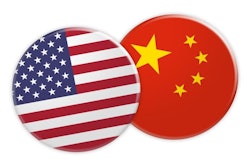
United Nations (UN) Secretary-General Antonio Guterres called for an acceleration of Black Sea grain shipments from Ukrainian ports under the Black Sea Grain Initiative as Russia threatens to quit the treaty next month.
The Black Sea Grain Initiative was brokered in July 2022 and will expire July 17.
"The secretary-general is disappointed by the slowing pace of inspections and the exclusion of the port of Yuzhny/Pivdennyi from the Black Sea Initiative," said Farhan Haq, UN deputy spokesperson for the secretary-general, in a written statement.
Haq noted food exports have dropped significantly from a peak of 4.2 million metric tonnes in October 2022 to 1.3 million metric tonnes in May, the lowest volume since the Initiative began last year.
"The secretary-general calls on the parties to accelerate operations and urges them to do their utmost to ensure the continuation of this vital agreement," said Haq.
Russia: Black Sea Grain Initiative can't be extended
On June 16, Senior Russian officials told Reuters the Black Sea grain deal could not be extended under current circumstances but that Moscow was working to ensure poorer countries would not suffer food shortages when it ends.
"It is impossible to update this deal, and under these conditions, I believe, it is also impossible to extend it because the limit of our patience and desire to implement it has been exhausted," Valentina Matviyenko, speaker of Russia's upper house of parliament, said according to Interfax news agency.
Russia has threatened several times not to extend the Black Sea grain deal unless a list of its demands regarding its own agricultural exports was met.
To convince Moscow to approve of the grain deal in 2022, a three-year accord was struck at the same time under which UN officials agreed to help Russia with its own food and fertilizer exports.
While Russian exports of food and fertilizer are not subject to Western sanctions imposed after the invasion of Ukraine, Moscow says restrictions on payments, logistics and insurance have amounted to a barrier to shipments, reports Reuters.
The UN has confirmed that it cannot do anything to address some of Russia's central grievances, the state TASS news agency cited Russia's Foreign Ministry as saying on June 20.
"The United Nations is fully committed to supporting the implementation of both the Black Sea Initiative and the memorandum of understanding on Russian food and fertilizer exports so that exports of food and fertilizers, including ammonia, from the Russian Federation and Ukraine reach markets around the world safely and predictably," said Haq in his written statement.
Ukraine has a Plan B if Russia exits grain deal
Ukrainian Agriculture Minister Mykola Solsky said this month Kyiv had a Plan B if Russia decided to quit the Black Sea deal.
Solsky said the government had already created a special insurance fund of around $547 million for companies whose ships would come to Ukrainian Black Sea ports under a new arrangement which would exclude Russia.
Ukraine has also said it can export grain via its small Danube river ports as well as through its Western border with the European Union, reports Reuters.
A senior Ukrainian diplomat told Reuters Russia is 99.9% certain to quit the UN-brokered deal in July because it no longer needs Ukrainian ports to export ammonia.
Olha Trofimtseva said Russian ammonia producer Uralchem had found an alternative route and does not need to export ammonia via Odesa.

















